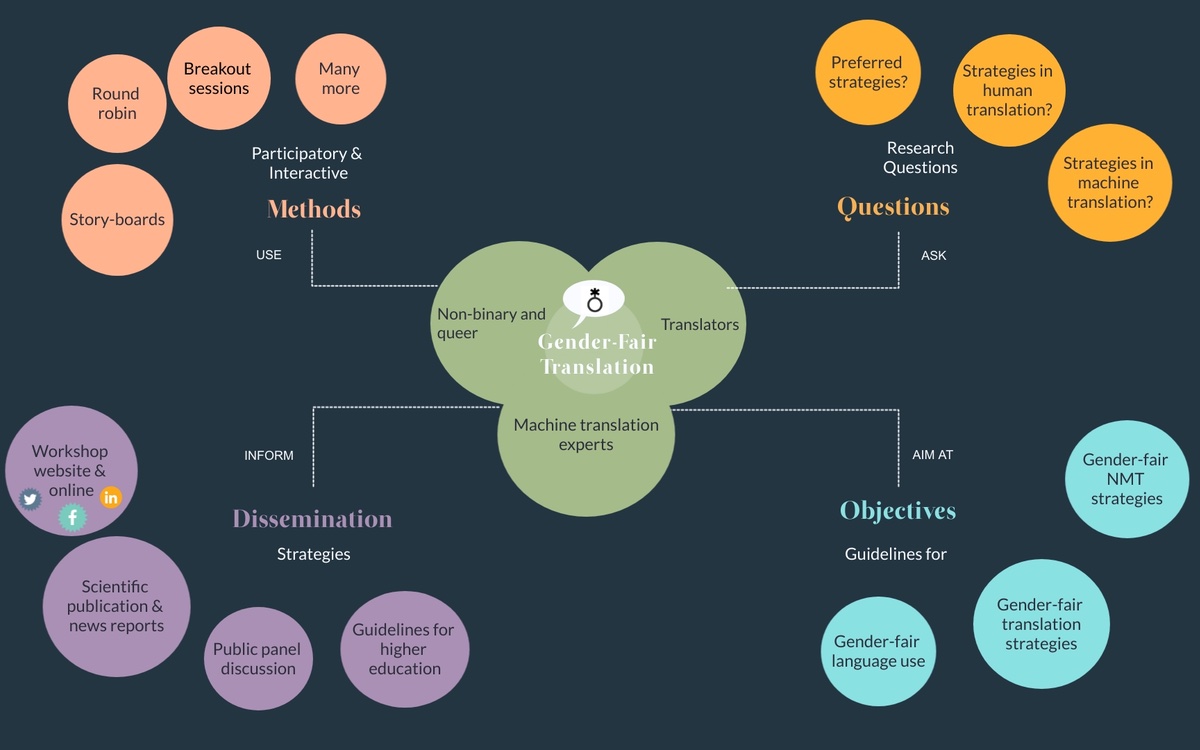
Project Details
- Consortium:
TU Wien, Human Computer Interaction Group, Institute of Visual Computing and Human-Centered Technology
University of Applied Sciences Campus Wien
University of Vienna , Centre for Translation Studies
St. Pölten University of Applied Sciences, Institute of IT Security Research
Project Contact Information
- Website:
https://genderfair.univie.ac.at -
Dagmar Gromann, University of Vienna
E-Mail
Abstract
With an increased visibility of non-binary people, strategies to overcome gender bias in language beyond a binary conception (male/female) have been proposed, such as gender-inclusive (e.g. Leser:innen) and/or gender-neutral (e.g. Lesens) language. These developments raise interesting questions for language technologies, including machine translation. To address non-binary MT, we propose to organize a three-day participatory workshop to develop translation guidelines for non-binary language use with three communities: (1) members of the non-binary and queer community, (2) human translators, and (3) machine translation experts. We will not present to the participants but they will teach us and discuss the topic in several interactive formats. To finalize the workshop we will organize a public panel discussion with selected experts, at which we will also present the workshop outcomes.
Outcome Summary
The GenderFairMT workshop and panel discussion clearly showed: One single gender-fair strategy for language and (machine) translation will not be the solution, since the choice depends on many factors, such as appropriate descriptions of persons, context, target audience, etc. Technology needs standardization, but this conflicts with the diversity that the topic and those affected demand. Specifically, the basic idea is: “This is about people’s needs, not just about implementing the most awesome technical solution.” The fact that this topic is not only highly relevant at this moment in time, but also of socio-political and economic importance is shown, on the one hand, by the media coverage we received (Standard interview, Ö1 report, podcasts), and on the other hand, by the fact that participants have carried the discussion to social media and specialist conferences, e.g., on technical communication.
In this inter-/transdisciplinary interaction, it has become clear how surprisingly far away from truly gender-fair language the current state of society, language use and language industry still are. It has become clear that our approach still requires a stronger focus on social aspects and raising awareness and less focus on technical aspects. Before technical solutions can be considered, there should be consistent, readable, and understandable solutions for language in the first place. Despite many initiatives to that end, constant developments and increasing international media coverage (e.g., Demi Lovato coming out as non-binary), the topic has currently not yet reached the masses and especially corporate awareness, as according to their own statements. Even some people responsible for diversity issues in companies who participated in our workshop had little to no prior knowledge of gender-fair language beyond a binary notion of gender. Sometimes discrimination thus occurs, e.g., in the form of misattribution of a gender identity, due to a mere lack of knowledge and awareness.
Methodologically, the project benefited greatly from the versatility of the workshop participants and the project team, and the participatory design process led to very creative activities and output. In general, the discussions were very lively, and the atmosphere was open, harmonious, very constructive, and appreciative throughout all three days. With a room full of people from different communities, most of whom did not know each other beforehand, this cannot be taken for granted and was a balm for the soul of the project team as well as very positive for the results of the project. Another important lesson learned was the self-reflection on our own use of language and the sensitization to very different perspectives, from the right to diversity to the need for economic and technical standardization.
One central aspect that we only became aware of through the workshop is that the degree to which team members are known in the communities is often not sufficient and the necessary trust must also be created for participation in the workshop. When individuals are invited to share personal experiences rather than participate as part of their professional identities, an appreciative and respectful environment must be guaranteed. Feedback from the individuals involved reinforced the importance of existing trust in the research team as a prerequisite for participating in such a workshop. For this reason, we would recommend first organizing events within individual communities to get a feel for the project team and the atmosphere created, and only then planning events with different communities.
Further Information
Best Paper Award at MuC 2022: Sabrina Burtscher & Katta Spiel
Video
When playing videos, data might be transmitted to third parties (Privacy Statement).